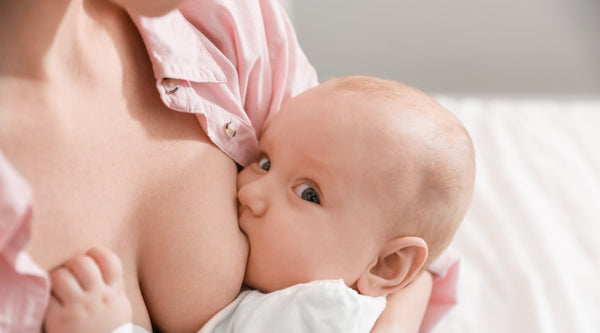Why do Babies Bite While Nursing?

Many breastfeeding mothers have gone through the issue where the baby latches on the nipple a lot while breastfeeding.
Some babies bite a lot during a nursing session while some only do it a few times. And of course, if you’re lucky, your baby may not bite. But if he does, the bite can be painful.
Today, we explore the causes of biting and discuss how you can deal with it.
Reasons why babies bite while breastfeeding
Below are some of the reasons why a baby may bite.
1. In newborns, the biting may be in response to a change in nursing position while the baby is nursing. It can also slow down the milk supply if they get too much milk while breastfeeding.
2. If your baby is six months or older and teething, he may be biting due to teething-related challenges. This is similar to your baby putting toys or objects in his mouth and biting them while teething.
3. Some babies bite when milk supply is low. When a hungry baby is frustrated with less milk flow, he may bite.
4. Sometimes, wrong attachment can also cause the baby’s teeth or gums to stick to your breast. When this happens, even if your baby isn’t biting, he may feel like he’s sucking vigorously.
5. Babies who are a little older can need your attention and bit down to get it.
How to deal with baby biting during breastfeeding?


1. If you think your baby is biting due to low milk supply, feed him more often.
2. If your baby bites, keep your little finger ready to break the suction.
3. If your baby is teething and biting, break the suction and give him something else to bite before continuing the nursing session.
4. If you think the problem is due to incorrect attachment, do the correct latch and breastfeeding position. Ideally, your baby’s tongue should cover his lower gums (or teeth) making him less likely to bite. A prone position usually gives you a deeper latch and helps discourage bites.
5. If your baby bites easily, give him a cool teething toy for a while before you start the breastfeeding session.


6. For a baby who is just starting to get new teeth, give him some time to get used to the new latching style.
For young children, teething can be a little strange. The biting problem often goes away when babies develop a latching style that allows them to use their tongues to accommodate their teeth.
7. When you feel that the baby is about to bite, you can also hold it closer. As their nose presses against your chest, the mouth opens and the biting stops.
8. Communicate with your baby while breastfeeding and as they are old enough to understand your tone and voice, praise them when they get through a feeding session without biting.
9. If you think your little one is biting to slow down the milk flow, remove the baby. You need to observe if the milk flow is initially high and may overwhelm the baby. If this is the case, just take a break and start feeding again.
10. If you think your baby is biting to get your attention, give the baby lots of attention by talking to him while breastfeeding.
Coping with bite pain while breastfeeding
Sometimes, babies may fear a negative reaction and refuse to feed the next time you offer.


If this happened to you, mommy, don’t blame yourself. All you need to re-establish your nursing sessions is to have patience. Continue offering the breasts with a little patience and encouraging words.
Also, if the baby is not feeding, consider pumping to maintain the milk supply until the baby starts latching again.
Biting can cause nipples to crack. Use a good nipple cream to help your nipples heal faster from the impact of the bite.
You can also consult your doctor to know which cream you should use. Ideally, you can continue breastfeeding even if this happens. However, if the pain is too much to bear, rest the nipple for a few hours and feed from the other breast. When you feed exclusively from one breast, milk production will increase to match your baby’s needs.
You may also consider using washable breast pads and nursing bras made from soft, gentle fabrics. Rough fabrics can make nipple cracks worse.


Final thoughts
Experts recommend that babies should be breastfed even beyond six months until the time when you and the baby can continue breastfeeding. Therefore, do not stop breastfeeding when the baby starts teething. Instead, recognize the patterns and use the tips given above to tackle the challenge.
Breastfeeding is one of the best decisions a mother makes for the health and well-being of her baby.
Yes, it comes with some challenges. But hang in there, mommy. You can do this.
Are you enjoying this post?
Feel free to share this with any mom. Join the community of moms today and receive weekly motherhood tips and tricks straight to your inbox. From time to time, we’ll send you updates on new launches and exclusive events, and you’ll always be the first to know.
Shop the Lovemère collection today.





